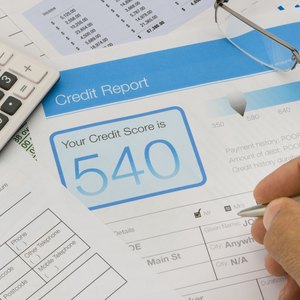
It seems like the folks deciding your credit score might be interested if you have cash stashed in a savings account. They aren’t. Though it might seem that the ability to save speaks to a sense of responsibility toward money in general, including handling credit wisely, credit scores are based on how you handle debt – not assets. Your credit score arises from your credit report, which lists credit accounts only, and these accounts testify for or against you to would-be lenders. Though a savings account won’t directly help your score, you can indirectly use it to raise your rating.
Tips
Credit scores are based on how you handle debt, not assets. Though a savings account won’t directly help your score, you can indirectly use it to raise your rating.
Secured Loan
Your credit union or bank might let you use a savings account to secure a loan. The institution approves the loan knowing it can take your savings account money if you don’t pay the loan back. To make sure the money is there in that worst-case scenario, you’ll no longer have access to the account after it becomes security. The interest you pay on the loan will be higher than the interest earned on the savings account, but if you need to raise your credit, you might feel it’s worth the price. Making on-time payments helps your credit rating.
Loans as Savings Accounts
A credit-builder loan is a product offered by some credit unions specifically designed to build credit. You take out a loan, which the credit union puts into savings account for you. Typically, you won’t have access to the loan money until later, after you’ve paid it back. Meanwhile, your new savings account earns interest. Some credit unions will release funds as you make loan payments. Meanwhile, you’re building credit. This kind of loan is useful for those who don’t have enough money up front to secure a loan on their own.
Secured Credit Card
Instead of using your savings account to secure a loan, you can use it as collateral for a credit card. You won’t have access to the savings account, but you’ll get a card with a line of credit that you can immediately spend. The credit line usually equals the amount of savings being held. The credit card issuer determines the deposit amount that will serve as collateral. As you use the card responsibly, you can build credit. Handle it well for a long enough time, and the issuer will release your cash.
Credit Boosters
So, if a savings account isn’t directly factored into a credit rating, what is? The biggest factor is whether you pay your bills on time. This accounts for 35 percent of your score. Nearly as important – worth 30 percent of your score – is your debt and how much available credit you’re using. This means that maxing out credit cards counts against you. Instead, use no more than 25 to 30 percent of your credit limit. The other scoring factors are credit history length, having different types of debt and how much new debt you have or are investigating.
References
- Capital One: Secured MasterCard
- eCredable: Do Checking Accounts Affect Your Credit Score?
- Consumer Financial Protection Bureau. "3 Common Credit Issues and What You Can Do to Fix Them." Accessed May 12, 2020.
- Debt.org. "Secured Credit Cards." Accessed May 12, 2020.
- Consumer Financial Protection Bureau. "Six Tips to Consider When You’re Offered a Retail Store Credit Card." Accessed May 12, 2020.
- Experian. "Will Being an Authorized User Help My Credit?" Accessed May 12, 2020.
- Federal Trade Commission. "Co-signing a Loan." Accessed May 12, 2020.
- My FICO. "What's in my FICO® Scores?" Accessed May 12, 2020.
- Consumer Financial Protection Bureau. "How Do I Get and Keep a Good Credit Score?" Accessed May 12, 2020.
- Federal Trade Commision. "Payday Loans." Accessed May 12, 2020.
- Experian. "How Long Do Late Payments Stay on Credit Reports?" Accessed May 12, 2020.
- Experian. "Inactive Credit Card: Use it or Lose it?" Accessed May 12, 2020.
- Federal Trade Commission. "Disputing Errors on Credit Reports." Accessed May 12, 2020.
- Federal Trade Commission. "Free Credit Reports." Accessed May 12, 2020.
- Consumer.gov. "Your Credit History." Accessed May 12, 2020.
Writer Bio
Sophie Johnson is a freelance writer and editor of both print and film media. A freelancer for more than 20 years, Johnson has had the opportunity to cover topics ranging from construction to music to celebrity interviews.

